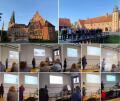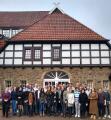The German Research Foundation has approved the continuation of the Chembion Research Training Group at the University of Münster. The program for research into ion channels will receive around 4.5 million euros.

The German Research Foundation (DFG) will fund the Research Training Group „Chemical Biology of Ion Channels (Chembion), located at the University of Münster, for a further 4.5 years. The participating doctoral students are researching small organic molecules with which the opening state of so-called ion channels can be specifically controlled. Ion channels are proteins that form pores in cell membranes and thus allow charged particles to pass through the cell membrane. This process plays an important role in the transmission of stimuli in nerve cells or the release of insulin, for example. The English-language doctoral program "Chemical biology of ion channels (Chembion)" will run in the second funding period from 1 April 2024 to 30 September 2028 and is funded by the DFG with around 4.5 million euros.
13 scientists from the Departments of Chemistry, Pharmacy and Medicine support the Research Training Group at the University of Münster. Prof. Dr. Bernard Wünsch from the Institute of Pharmaceutical and Medicinal Chemistry is the spokesperson for the program and explains the background to the research interest: "We are combining molecular expertise from pharmacy with cell physiological expertise from medicine in order to learn more about ion channels as important chemical control instruments in cells, tissues and organs. The targeted opening and closing of ion channels could lead to a wide range of applications, for example in cancer therapy or in the treatment of neuronal diseases."
The interdisciplinary collaboration between pharmacy/chemistry and medicine is also reflected in the graduate program, emphasizes the spokesperson: "All doctoral students are accompanied by two mentors from both disciplines. The element of "lab rotation", i.e. switching between the labs, allows the doctoral students to get to know new working methods." The independent organization of meetings and conferences also strengthens the young researchers' initiative and independence. A six-month stay abroad enables doctoral students in the Research Training Group to exchange ideas with international colleagues.
Structured doctorate at the University of Münster
Research Training Groups are university institutions for the promotion of young academics. They are funded by the DFG for a maximum of nine years. The focus is on the qualification of doctoral students within the framework of a thematically focused research program and a structured qualification concept. There are three DFG-funded Research Training Groups (RTGs) at the University of Münster.
Links:
Press release no. 45 of the DFG from 08.11.2023:




















































